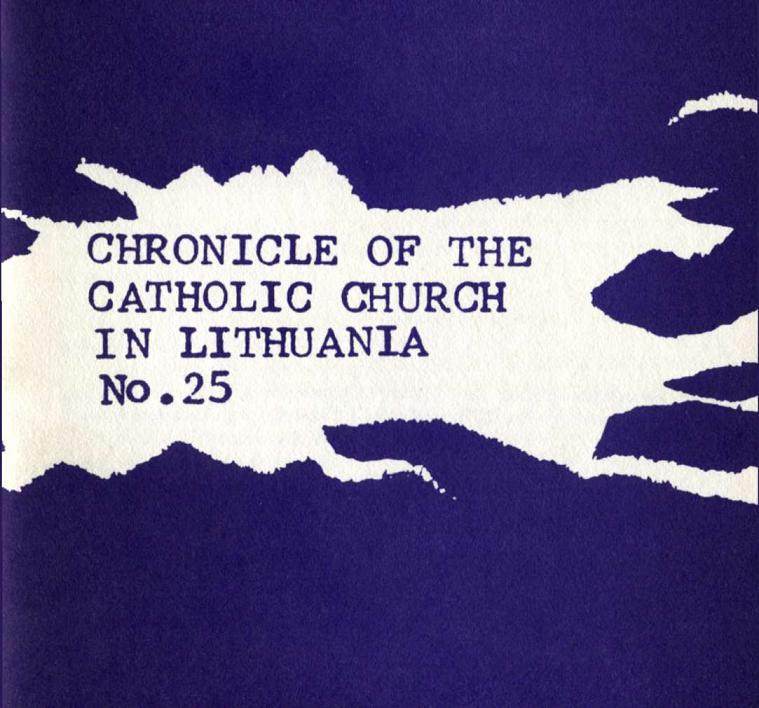THE CHRONICLE OF THE CATHOLIC CHURCH IN LITHUANIA No. 25 
In This Issue:
We Thank the Catholics of Ireland
The Trial of Father Jokubauskas
The Struggle Over the Chapel at Slabadai
The Persecution of Algimantas Šalčius
Lithuania December 25, 1976

CHRONICLE OF THE CATHOLIC CHURCH IN LITHUANIA No. 25
A Translation of the Complete Lithuanian Original, LIETUVOS KATALIKŲ BAŽNYČIOS KRONIKA No. 25 Documenting the Struggle for Human Rights In Soviet-Occupied Lithuania Today
Translation Editor: Rev. Casimir Pugevičius Published by the Lithuanian R.C. Priests' League of America 351 Highland Blvd. Brooklyn, NY 11207
©Lithuanian Roman Catholic Priests' League of America 1978 Printed by
Franciscan Fathers Press 341 Highland Blvd. Brooklyn, NY 11207
CHRONICLE OF THE CATHOLIC CHURCH IN LITHUANIA No. 25
INTRODUCTION
The Chronicle of the Catholic Church in Lithuania, No. 25, dated Christmas, 1976, opens with a brief word of thanks to a group of Catholics in Ireland, who had unsuccessfully tried to obtain permission from the Soviet government necessary to bring to Lithuania a statue of Our Lady of Fatima. "The Soviet government was able only to prevent delivery of the gift, but it was powerless to prevent your love and solidarity with the suffering from reaching us."
A new series of raids and arrests is documented, including those of Ona Pranckūnaitė and Vladas Lapienis. A formal complaint by Father Antanas Jokubauskas against harassment by the KGB follows.
This issue of the Chronicle describes in detail the frustrating history of negotiations between the Catholics of Slabadai and the government, over the right of the faithful to worship in their local church, which has been turned into a grain mill.
This is followed by the personal history of Algimantas Šaltis, who since youth has suffered persecution for his religious beliefs.
The latest developments in the case of Mečislovas Jurevičius, suffering job discrimination because of his religious convictions, are also described.
Father Juozas Zdebskis is reported to have been falsely accused of driving under the influence of alcohol; hundreds of religious believers come to his defence.
Since 1972, the Chronicle of the Catholic Church in Lithuania has scrupulously documented the struggle for human rights in that Soviet-occupied country, on the eastern shore of the Baltic Sea.
Laborously typed in carbon copies, and passed secretly from hand to hand, theChronicle is ultimately smuggled out to the western world, where it has caused a sensation.
The Chronicle describes the heroic efforts of some 3 million Lithuanians, 85.5% Roman Catholics of the western rite when the country was forcibly annexed by the Soviet Union in 1940, to preserve the faith of their forebears.
Is is a story of six dioceses with no resident bishop and no normal contacts with the outside world, trying to maintain traditional ecclesiastical forms of administration. In reality, all decisions are made by the state-appointed Deputy for Religious Affairs— an atheist.
It is the story of the struggle between clergy who have decided for one reason or another to cooperate with the regime, and stubborn dissident priests and faithful insisting on their rights under the Soviet Constitution, the Universal Declaration of Human Rights, and Natural Law.
It is the record of heroic parents of children, who insist on rearing their offspring in the Catholic Faith, against all efforts by teachers and government youth leaders to dragoon youngsters into various Communist youth organizations.
The Chronicle is the record of mere school children risking the wrath of atheistic teachers and even of Security police, to go to church or sing in a choir.
Constantly harassed in one way or another, the religious believers of Lithuania find themselves in the position of second-class citizens.
Denied access to mass media to tell their story, or to religious literature to nourish their faith, the Catholics of Lithuania find it necessary to photo-copy such religious literature as they can lay their hands on.
Ironically, the Soviet constitution, under which the people of Lithuania are forced to live, contains glowing guarantees of freedom of conscience, of assembly, of press, and of speech.
In practice, such constitutional guarantees are over-ridden by unwritten administrative decrees, verbal interpretations, and galling bureaucratic high-handedness, giving atheism the position of the established religion of the Soviet Union and its subject territories.
The message of the Chronicle, loud and clear, is that the atheistic government is slowly strangling the Church in Lithuania, while doing its best to make it look like the Church is dying a natural death. The people of Lithuania are risking imprisonment, labor camp, and torture to make sure that we are not deceived.
In this translation, done in part by Dalia Bulvičius, every effort has been made to remain faithful to the original in every respect, even at the expense of style in some instances. When absolutely necessary, a brief Translator's Note provides background within the text itself.
Rev. Casimir Pugevičius Translation Editor





